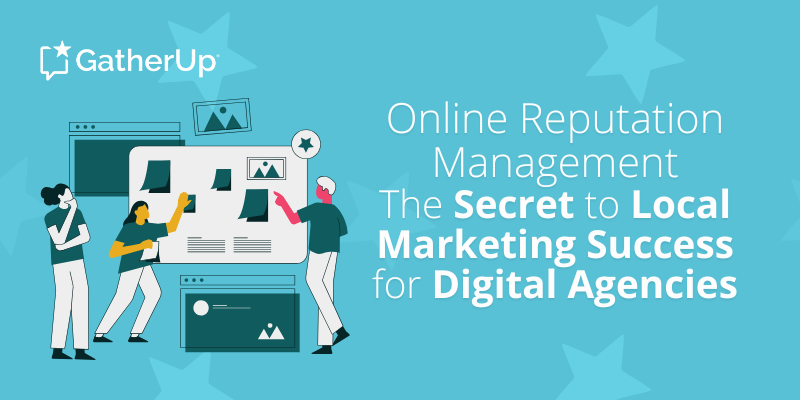
There’s an undeniable shift happening in digital marketing. The days of simply optimizing a Google Business Profile (GBP) or running ads with bottomless budgets to generate leads are over. If your agency isn’t helping clients proactively manage their online reputation, you’re leaving them—and yourself—exposed to dwindling ROI and placing your digital agency at a disadvantage..
Local businesses live and die by trust, and in today’s landscape, trust is built (or broken) through online reviews also known as a business’ online reputation. 99% of consumers read reviews before choosing a local business, and 85% trust them to guide their decision-making. If your agency isn’t treating reputation management as a foundational service, you’re missing a key growth lever—for both your clients and your own business.
“We Can’t Get Ads to Perform Without It”—Experts Weigh In
During a recent panel discussion featuring digital marketing experts Joy Hawkins, Founder (Sterling Sky), Jim McDannald, DPM, Founder (Podiatry Growth), and Ron Callis (One Firefly), one theme kept surfacing: online reputation isn’t a side project—it’s the backbone of their digital agency’s success.
Hawkins didn’t mince words:
“I’ve heard of agencies that won’t even work with businesses unless they agree to an aggressive review strategy. We can’t get ads to perform, we can’t get their listings to perform, without strong review profiles.”
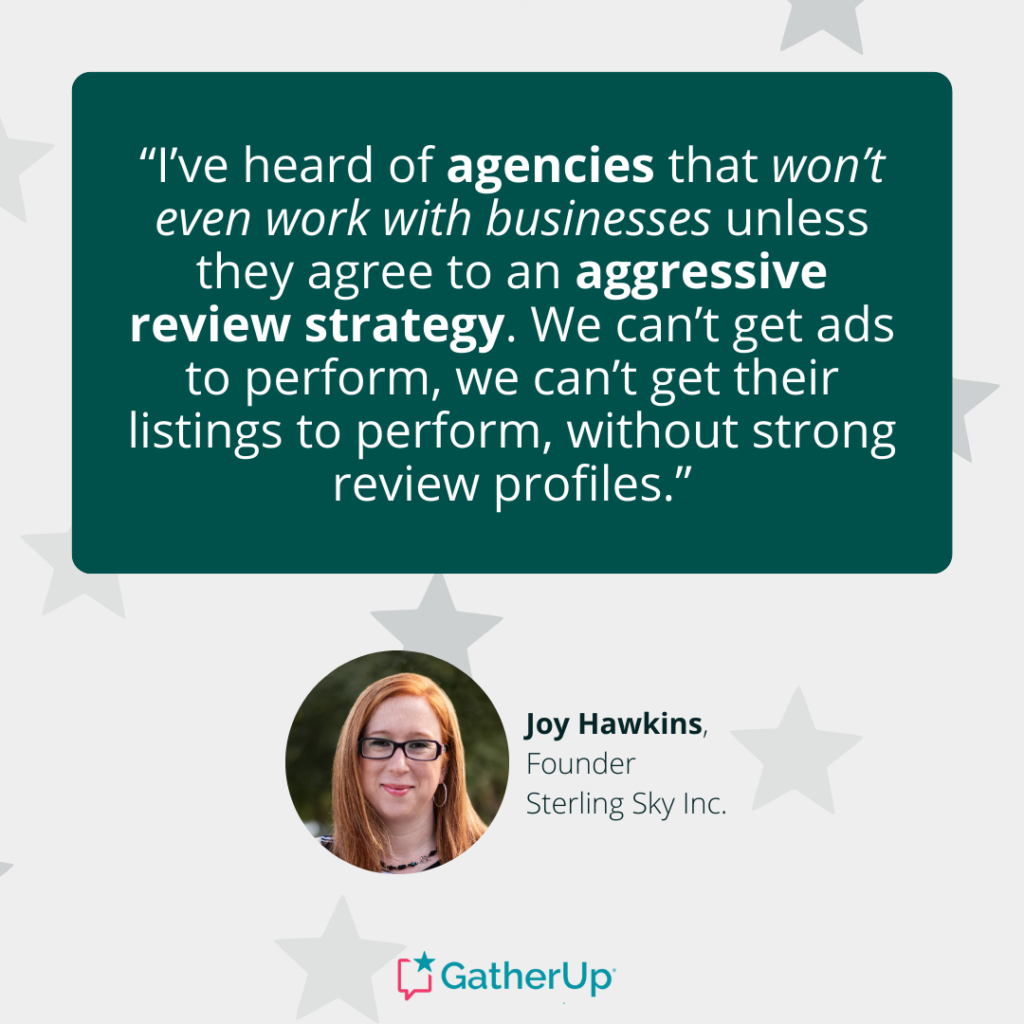
Translation? If a business isn’t consistently earning positive reviews and responding to feedback, even the best marketing strategy will struggle.
McDannald, who works with healthcare professionals, emphasized just how much Online Reputation Management (“ORM”) impacts patient trust:
“It’s not just about having negative reviews—it’s about what happens when you don’t respond. If a clinic has bad reviews and zero responses, it signals to potential patients that they don’t care. That’s worse than the review itself.”
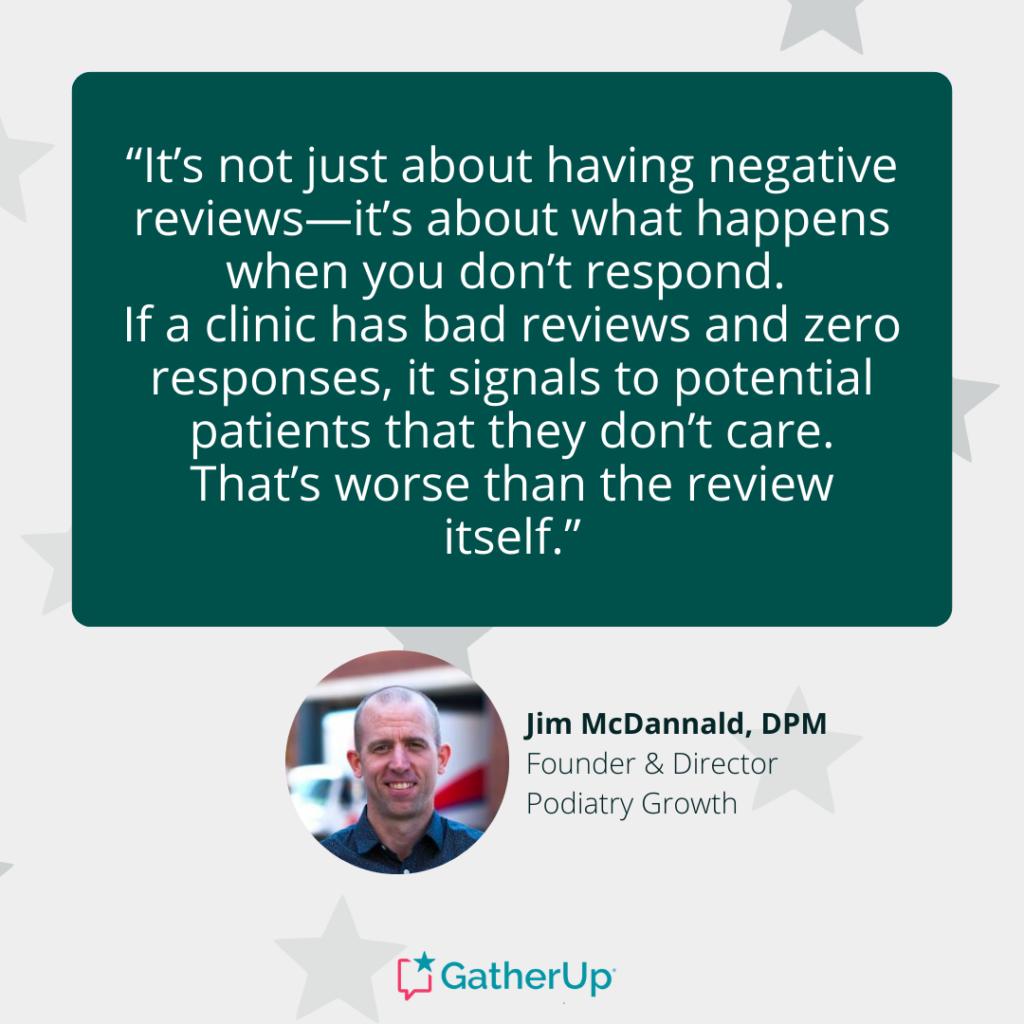
And Ron Callis took it a step further, explaining how his agency requires reputation management as part of their client success playbook:
“We explain to clients that reviews are like a restaurant’s parking lot. If you drive by on a Friday night and the lot is empty, are you going in? Probably not. Reviews provide that same social trust online.”
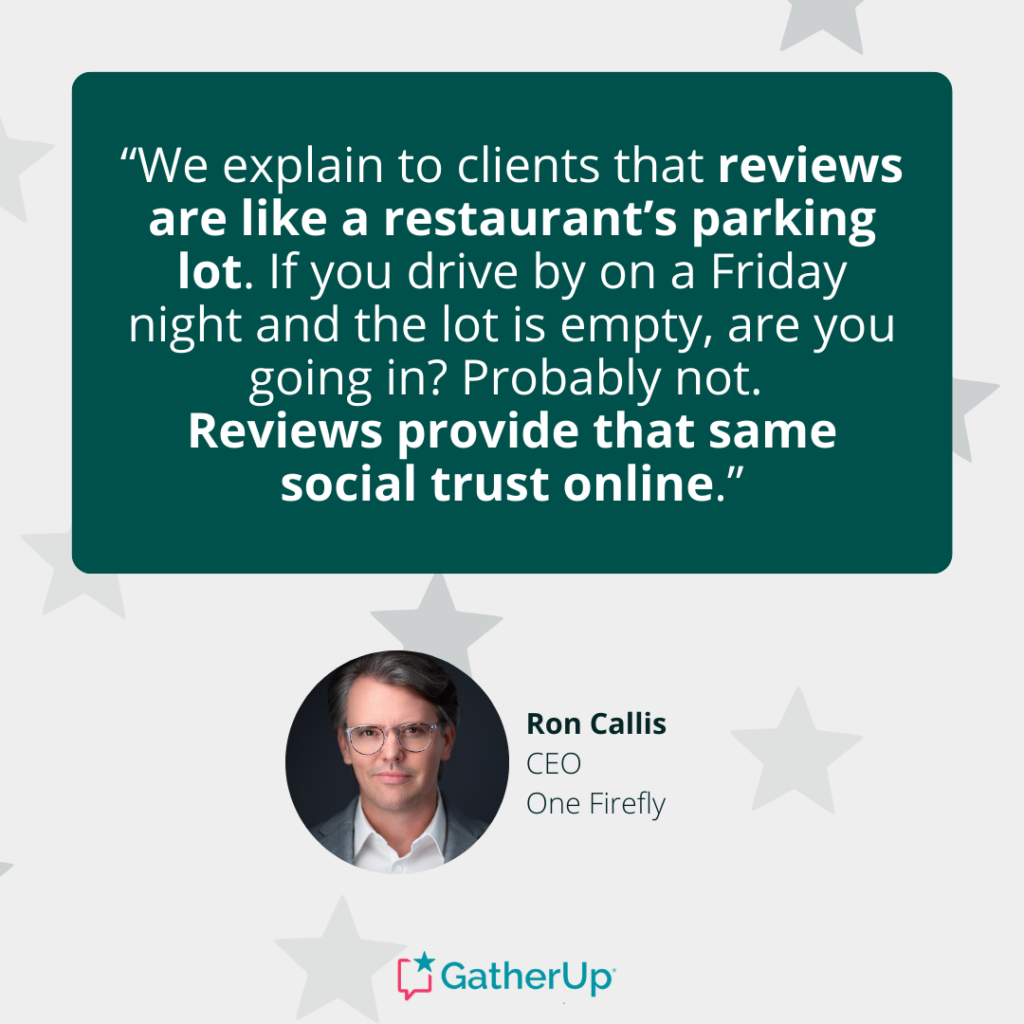
It’s an easy sell once business owners understand that consumers behave online exactly how they do in the real world. A full restaurant? Must be great. A deserted one? Pass.
The Real Impact of Online Reviews (It’s Bigger Than You Think)
GatherUp’s Q4 2024 How Americans Use Reviews to Choose Local Businesses research offers some enlighting insights:
✔ 82% of consumers prefer businesses that actively respond to reviews.
✔ 73% of unhappy customers will give a business a second chance if the owner responds and solves their issue.
✔ Only 14% of consumers would risk trying a business that has a review warning label.
If you’re not helping clients proactively manage their reputation, they aren’t just losing leads—they’re repelling potential customers.
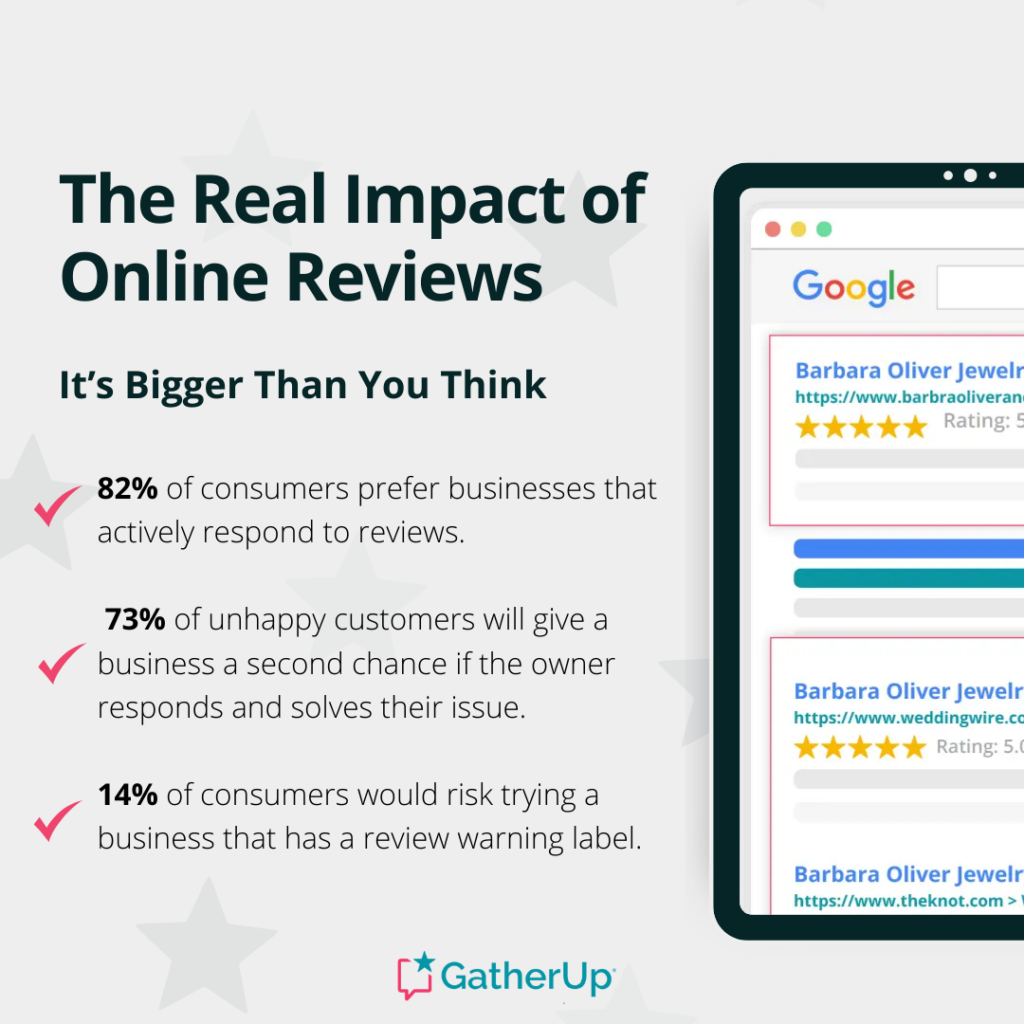
Agencies That Offer Online Reputation Management (ORM) Win and Retain More Clients
A common misconception? That reputation management is a “nice-to-have” instead of a revenue driver. Agencies that embed ORM into their offering don’t just improve client results—they create stickier relationships.
Ron Callis’s agency, One Firefly, figured this out early. They realized that their clients—home service businesses—were terrible at requesting online reviews. Instead of waiting for them to figure it out, they built it into their service package.
“We don’t just sell them software. We train their staff, run role-playing scenarios, and coach them on how to make the ask. We even help them set up incentives for their team to participate in review collection.”
The results? Clients who actively follow this process win more business and retain more customers—and those agencies see higher retention because their clients can’t afford to walk away.
Fake Reviews and the Trust Problem
While ORM can be a game-changer, fake reviews and AI-generated responses are poisoning the well.
Fake reviews are a growing problem, especially with the growth of artificial intelligence technology. According to The Transparency Company, 14% of reviews online are fake. And according to Google, in 2022 they “blocked or removed over 115 million policy-violating reviews … over 20% more fake reviews than we did in 2021.”
That is why the FTC released its ruling banning fake reviews in August 2024.
It is incredibly easy to buy fake reviews for your business. And many business owners and agencies are in order to rank more highly. Don’t. It is illegal, costly (the maximum civil penalty is currently $51,744 per violation), and risks your brand trust.
Hawkins pointed out that Google is now rolling out warning labels for businesses caught incentivizing reviews. It’s not widespread yet, but once it is, expect public trust to shift hard against brands that manipulate ratings.
“If you get caught buying reviews, it’s going to be a nightmare to fix. It’s just not worth the risk.”
With 99% of consumers regularly consulting reviews before engaging with a business, both early in the buying process and just moments before engaging with a business, ignoring this problem is no longer possible. Online reputation is here to stay and taking control of the narrative is more important than ever.
Reputation Management is About Relationships
Another looming issue? Fully AI-generated and automatic review responses. While leveraging AI is a time-saver, 60% of consumers say they lose trust in brands that use AI to respond to reviews. Fully automating responses with AI is risky and impersonal.
However, many ORM vendors purport that fully automating with AI is the way to go, it is definitely not – and business owners must balance the need to engage with and answer reviews while constantly soliciting feedback from customers.
“You can tell when a response is robotic,” McDannald added. “It’s not just about responding—it’s about [responding as] a real human who cares.”
The takeaway? Reputation management isn’t just about collecting five-star reviews. It’s about building credibility and fostering trust. Furthermore, businesses need help, and that is something agencies can deliver.
At GatherUp, we believe that Digital Agencies are the stewards of their client’s brand voice, and review responses is something that agencies can help deliver at scale. How we approach AI is by making it a scale-enabler but not a human-replacer. In other words, we leverage AI to help Agencies keep their human-touch at scale by assisting them with deriving insights and feedback to share with their clients, embed them in their clients review management approval workflows, and delivering thoughtful, brand-aligned, answers and responses that customers online reviews deserve.
How Agencies Should Approach ORM in 2025
If you’re running a digital agency and ORM isn’t part of your core service offering, it’s time to change that. Here’s what you need to do:
✔ Make reputation management part of your Local Marketing bundle. It’s not a bonus—it’s fundamental to local search, PPC performance, and long-term client success.
✔ Educate your clients on proactive review acquisition. Most businesses don’t have a structured system—be the one to provide and automate it.
✔ Prioritize review response training. Consumers don’t just look at reviews—they look at how businesses handle feedback.
✔ Help businesses fight fake reviews the right way. Show your clients how to flag fraudulent reviews on their and their competitors profiles while maintaining public trust or work with us to do it on your behalf
✔ Encourage employee incentives. One of the most effective tactics? Paying employees for every 5-star review that mentions them by name.
As Hawkins put it bluntly:
“Businesses that don’t take reputation management seriously are going to lose to competitors that do.”
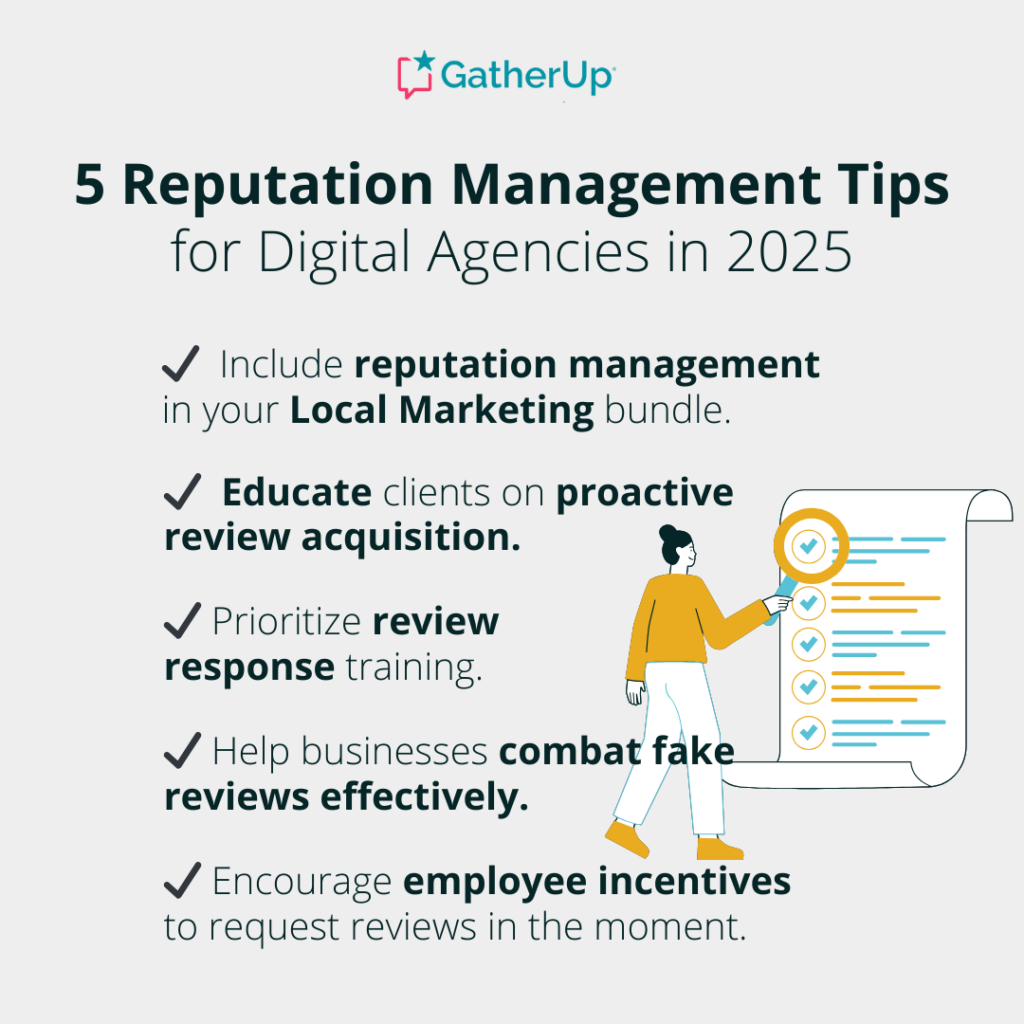
The Bottom Line: ORM Isn’t Optional Anymore
The data is clear. The experts agree. If your agency isn’t offering reputation management as a core service, you’re putting yourself at a competitive disadvantage and doing a disservice to your clients.
In 2025, ORM is not a set-it-and-forget-it task. It’s an active strategy that requires continuous engagement, a structured system, and a mindset shift from agencies and businesses alike.
The digital agencies that master reputation management now will be the ones that dominate in the years to come.
